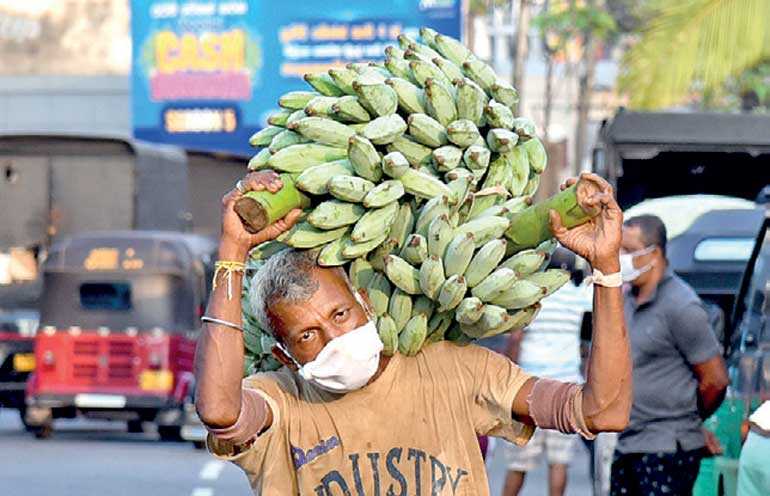Tuesday Feb 17, 2026
Tuesday Feb 17, 2026
Tuesday, 20 October 2020 00:51 - - {{hitsCtrl.values.hits}}

A daily wage earner carries a bunch of plantains at the Manning Market in Pettah – Pic by Ruwan Walpola
By Uditha Jayasinghe
A robust Government road map should underpin concentrated and targeted policies needed in Sri Lanka’s COVID-19 recovery phase to increase the country’s share of exports, fast-track existing foreign investments and instil a V-shaped rebound that will lead to sustained growth, says a new report. Sri Lanka State of the Economy 2020 report compiled by Institute of Policy Studies (IPS) titled, “Pandemics and Disruptions: Reviving Sri Lanka’s Economy COVID-19 and Beyond,” said that such a comprehensive and cohesive effort would also have to take into account that the country’s poor and vulnerable communities will take a long time to regain livelihoods that were adversely affected for extended periods. The report said Budget 2021, expected to be presented to parliament in mid-November, should not miss the opportunity to enact fiscal and monetary policies for a resilient recovery and sustainable long term growth.
“A robust road map will go a long way to help bypass risks and mitigate the disruptive effects of the COVID-19 pandemic, without major run long costs for the Sri Lankan economy,” it added.
The report also dwelt extensively on the different policy actions needed in a range of spheres, including minimising costs of pandemics, social protections, women, education, technology and protecting SMEs to move Sri Lanka’s economy forward. It emphasised many key sectors, such as migrant workers, exports and tourism were severely impacted, resulting in direct impact on the poor. Many migrant families depend on remittances, ancillary services like handicrafts depend on tourism and large numbers of unskilled young females rely on the garments industry for jobs.
“Sustained recovery for the poor means reviving livelihoods and generating employment opportunities across the country. Craft and related trade workers – a large share of whom are in the construction sector—is one of the poorest socio-economic groups. An early revival of construction activities can help boost employment prospects for large numbers of low-skilled manual workers.
“Other sectors that can get back to productive employment are agriculture and fisheries. Here, too many are among the poorest and government efforts to focus on domestic agriculture production can help them to get back on their feet. Thus, a prioritised and planned recovery strategy can help target Sri Lanka’s poor to ensure an equitable development path beyond COVID-19,” it added.
In providing assistance or stimulus to specific industries or investing in large scale projects such as infrastructure, the Government has to be careful of the extent of support, given the high fiscal deficits and debt situation. In this regard, IPS recommended that the Government ensure there are clear objectives with an emphasis on solidarity and equity, to avoid being perceived as favouring vested interests.
“Targeted temporary and progressive fiscal policy measures to maintain basic needs of households and to businesses to prevent layoffs and exits from supply chains. Cost effective and embedded tax and spending measures in medium-term budget frameworks would be productive in ensuring long-lasting deterioration of public finances are minimised,” the report stated.
Given its focus on labour-intensive industries, the IPS report noted sectoral policies related to Sri Lanka’s tea industry should be viewed from two fronts; one how to best prepare the industry to cope with external shocks like the COVID-19 pandemic and secondly how to increase the long-term reliance of the tea industry. More attention has to be paid to enhancing value addition towards more herbal and healthy tea products as an option to increase the resilience of the tea industry.
“Sri Lanka’s tea exports should be expanded beyond traditional positioning of hot beverages and instead look at ready-to-go products. All these will require a comprehensive reassessment of the long-term prospects of the industry, which is beset by high costs of production, which has allowed newcomers such as Kenya to outperform Sri Lanka. Introduce modern technology, enhance technical skills and innovation capacity, as well as warehousing, packaging and quality assurance areas. COVID-19 should be viewed as a “wake-up” call and an opportunity for all stakeholders to collectively drive growth.”